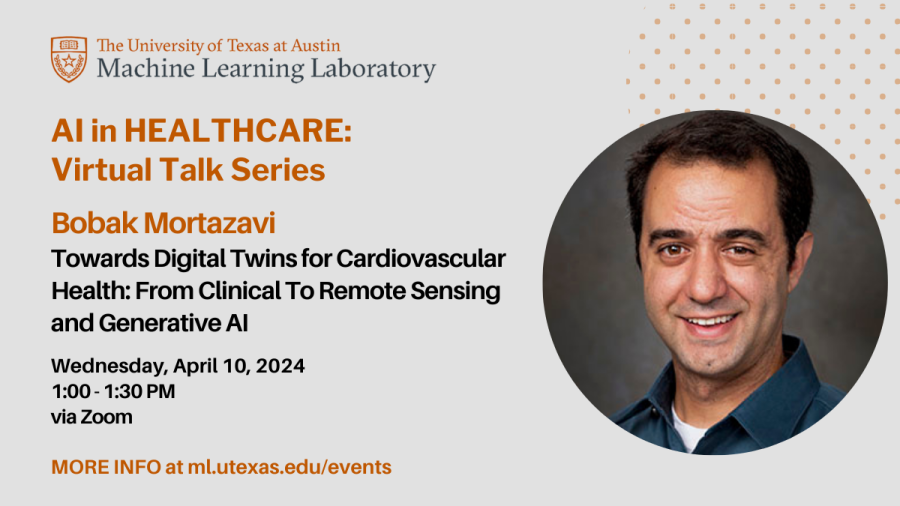AI in HEALTHCARE: Virtual Talk Series
April 10, 2024 at 1:00 PM
Bobak Mortazavi, Associate Professor, Texas A&M University
Title: Towards Digital Twins for Cardiovascular Health: From Clinical To Remote Sensing and Generative AI
Join via Zoom: https://utexas.zoom.us/j/5128555388
Talk recordings can be found here: https://www.ifml.institute/recorded-talks
April 10, 2024 at 1:00 PM
Bobak Mortazavi, Associate Professor, Texas A&M University
Title: Towards Digital Twins for Cardiovascular Health: From Clinical To Remote Sensing and Generative AI
Join via Zoom: https://utexas.zoom.us/j/5128555388
Talk recordings can be found here: https://www.ifml.institute/recorded-talks

Abstract: Recent techniques have led to advancements in clinical modeling, resulting in advancements in interpretation, evaluation, and risk prediction in cardiovascular outcomes. Large datasets, a focus on integrating electronic health records and clinical trials data has enabled improvements in cardiovascular care. However, there still remain significant gaps in patient care. Within the clinic, models are still used in isolation, without continually learning and representing patient status across various decision making points. Even more limited is the monitoring and modeling of patient recovery post discharge, in remote, personal environments. In this talk we explore linking clinical and remote health for personalized cardiovascular care, moving towards an eventual digital twins approach to cardiovascular care, leveraging generative AI to make advancements in personalized decision making and risk modeling for improved patient outcomes.
Speaker Bio: Bobak Mortazavi, PhD, is an Associate Professor of Computer Science & Engineering at Texas A&M University and holds an affiliation with the Yale University School of Medicine’s Center for Outcomes Research and Evaluation. His research focuses on the intersection of wearable technology, machine learning, and cardiovascular-focused clinical outcomes research, to develop longitudinal, personalized models of health. As a member of the PATHS-UP Engineering Research Center, he has made important contributions in enabling wearable sensing technologies for personal health monitoring and integrating machine learning modeling for improving the use of this data in the context of clinical outcomes, with his work supported by awards from DARPA, the NSF, and the NIH.